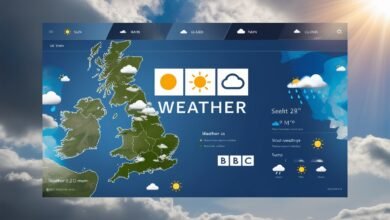BBC Weather Newcastle upon Tyne

BBC Weather Newcastle upon Tyne
Discover everything about BBC Weather Newcastle upon Tyne, including detailed forecasts, city attractions, climate, and tips for visitors. Your complete guide!
Introduction:
Newcastle upon Tyne, often called Newcastle, is a vibrant city in northeast England known for its rich history, cultural heritage, and iconic landmarks. Whether you plan to visit or reside in this bustling city, staying informed about the weather is crucial. Weather conditions can significantly influence your daily activities, travel plans, and mood. This guide provides everything you need to know about BBC Weather forecasts for Newcastle upon Tyne, offering insights into the city’s climate, monthly weather trends, and tips for making the most of your time in Newcastle, regardless of the weather.
Understanding Newcastle upon Tyne: A Quick Overview:
- The Historical Significance of Newcastle:
Newcastle upon Tyne has a history that dates back to Roman times when it was known as Pons Aelius. The city grew significantly during the Middle Ages and became a key hub for coal mining and shipbuilding during the Industrial Revolution. Some of the city’s most iconic historical landmarks include Newcastle Castle, where the town gets its name, and the Tyne Bridge, a symbol of its city’s past. The rich history of Newcastle is reflected in its architecture, museums, and cultural sites, making it a fascinating destination for history enthusiasts. - Modern-Day Newcastle: A Hub of Culture and Commerce:
Today, Newcastle is a thriving modern city with a dynamic economy, a renowned university, and a vibrant cultural scene. The city is home to numerous theaters, art galleries, and music venues, and it hosts a variety of festivals and events throughout the year. Additionally, Newcastle’s economy is diverse, with strong sectors in education, digital technology, retail, and healthcare. The city is also known for its lively nightlife, particularly in the area around the Bigg Market and the Quayside. - Newcastle’s Geographic Location and Its Impact on Weather:
Newcastle is situated on the northern bank of the River Tyne, about 8.5 miles inland from the North Sea. Its location in northeast England means it experiences a temperate maritime climate characterized by mild summers, cool winters, and moderate rainfall throughout the year. The city’s location on the North Sea influences its weather patterns, often bringing cooler temperatures and occasional coastal fog, particularly in the spring and early summer.
The Climate of Newcastle upon Tyne: What to Expect:
- Overview of Newcastle’s Climate:
Newcastle upon Tyne enjoys a temperate maritime climate, typical of much of the UK. This means the city experiences relatively mild weather year-round, with no extreme temperature fluctuations. Summers are generally relaxed and comfortable, while winters are cold but not severe. Rain is spread throughout the year, with the wettest months typically being October and November. Snowfall is relatively uncommon but can occur during the winter months. - Precipitation Patterns and Weather Phenomena:
Newcastle receives moderate rainfall throughout the year, averaging around 700mm annually. The wettest months are typically October and November, while the driest are April and May. Snowfall is relatively rare in Newcastle but can occur between December and February, with January often seeing the most snow days. Fog can also be a common occurrence, particularly in the spring and autumn months, due to the city’s proximity to the North Sea.
Temperature Trends Throughout the Year
-
- Winter (December to February): During winter, temperatures in Newcastle typically range between 1°C and seven °C (34°F to 45°F). Cold snaps can bring temperatures to freezing or below, particularly in January and February, the coldest months.
- Spring (March to May): Spring sees gradually warming temperatures, with averages ranging from 4°C to 14°C (39°F to 57°F). This season is marked by longer daylight hours and blooming flowers. However, the weather can still be unpredictable, with occasional showers.
- Summer (June to August): Summer temperatures are usually mild, with averages between 12°C and 20°C (54°F to 68°F). July is often the warmest month, but heat waves are rare. Coastal breezes from the North Sea help to keep temperatures comfortable.
- Autumn (September to November): Autumn brings cooler temperatures, ranging from 6°C to 15°C (43°F to 59°F). This season is known for its vibrant fall foliage, especially in the city and green spaces. Still, it also sees an increase in rainfall.
BBC Weather Newcastle: How It Works:
Understanding the BBC Weather Forecasting System:
The BBC Weather Service is one of the UK’s most trusted and widely used weather forecasting services. It relies on data gathered from a variety of sources, including the UK Met Office, weather satellites, radar, and ground-based weather stations. The data is processed using sophisticated computer models that simulate the atmosphere and predict weather conditions for different locations, including Newcastle upon Tyne. These models are updated regularly to provide accurate and up-to-date forecasts.
Key Features of BBC Weather for Newcastle
BBC Weather offers several key features that make it easy for residents and visitors to stay informed about the weather in Newcastle:
- Hourly Forecasts:
Provides detailed hour-by-hour weather updates, helping you plan your day with precision. - Daily Forecasts:
Gives an overview of the expected weather conditions for the day, including temperature, wind speed, and precipitation. - Weekly Forecasts:
Offers a broader view of the weather for the upcoming week, helping with longer-term planning. - Weather Alerts are issued:
for severe weather conditions such as heavy rain, strong winds, or extreme temperatures, allowing you to take necessary precautions.
How to Access BBC Weather Updates for Newcastle:
You can access BBC Weather updates for Newcastle upon Tyne through multiple platforms:
- Website:
Visit the BBC Weather website and enter “Newcastle upon Tyne“ in the“ search bar to view the latest forecasts. - Mobile App:
The BBC Weather app is available for Android and iOS devices and provides weather updates on the go. - TV Broadcasts:
BBC Weather forecasts are also available during news broadcasts on BBC One and BBC Two. - Smart Devices:
You can get weather updates through smart home devices like Amazon Alexa or Google Home by simply asking for the weather in Newcastle.

Month-by-Month Weather Guide for Newcastle upon Tyne:
- January to March: Winter Weather:
Newcastle’s winter months are typically cold and damp. January and February are the coldest months, with average temperatures ranging between 1°C and seven °C (34°F to 45°F). Snow is possible, particularly in January, though it is usually light and melts quickly. March sees a slight warming trend, with temperatures ranging from 3°C to 10°C (37°F to 50°F). Winter attire, including warm coats, gloves, scarves, and waterproof footwear, is essential. - April to June: Spring Awakening:
Spring in Newcastle is a season of transition, with temperatures gradually warming and daylight hours increasing. April starts with cooler temperatures ranging from 4°C to 11°C (39°F to 52°F), but by June, temperatures can reach as high as 14°C to 19°C (57°F to 66°F). This season is ideal for outdoor activities as the weather becomes more pleasant, although spring showers are shared. A light jacket, layers, and an umbrella are recommended during this time. - July to September: Summertime in Newcastle:
Summer in Newcastle is mild and enjoyable, with average temperatures ranging from 12°C to 20°C (54°F to 68°F). July is usually the warmest month, but even then, temperatures rarely exceed 25°C (77°F). The North Sea’s sparsity often brings refreshing breezes, making summer days comfortable. This season is perfect for exploring the city’s attractions and attending festivals. Light clothing, sunglasses, and sunscreen are recommended, but it’s worth cooler evenings to carry a light jacket or sweater. - October to December: Autumn and the Onset of Winter:
Cooler temperatures and increased rainfall mark autumn in Newcastle. October begins with temperatures ranging from 6°C to 14°C (43°F to 57°F), gradually cooling as winter approaches. November and December are chilly, with temperatures dropping to 2°C to 8°C (36°F to 46°F). The city’s cities are lovely this season, with autumn leaves creating a picturesque setting. Raincoats, warm layers, and sturdy footwear are essential as the weather becomes wetter and colder.
The Role of BBC Weather in Newcastle’s Daily Life:
- Daily Commuters and Weather Awareness:
For daily commuters in Newcastle, staying informed about the weather is crucial. Rain, fog, and icy conditions can affect travel times and road safety. BBC Weather provides real-time updates on weather conditions, helping commuters plan their journeys and avoid delays. Whether travelling by car, public transport, or on foot, checking the weather before you leave can save time and ensure you’re ready for any conditions. - Event Planning and Weather Considerations:
Newcastle is known for its lively events and festivals, many of which are held outdoors. The weather can significantly impact attendance and enjoyment, whether it’s an event, market, or sports event. BBC Weather offers forecasts that are vital for event organizers and attendees alike. By monitoring the weather, you can plan for contingencies such as rain or high winds and ensure your event goes off without a hitch. - Health and Safety: Dealing with Newcastle’s Weather Extremes:
Newcastle, while generally mild, can sometimes present health and safety challenges. Cold snaps during winter can lead to icy conditions, increasing the risk of slips and falls. High winds can cause disruptions and pose dangers, especially near the coast. BBC Weather provides alerts for extreme weather conditions, allowing residents to take appropriate precautions. For example, it is advisable to secure loose objects outdoors during high winds and avoid unnecessary travel.
Weather-Related Activities in Newcastle upon Tyne:
- Outdoor Activities for Different Seasons:
Newcastle offers a variety of outdoor activities that are enjoyable in different seasons. During the spring and summer, popular activities include walking or cycling along the Quayside, exploring Jesmond Dene, or visiting Tynemouth Beach. In autumn, the city’s cities, such as Exhibition Park and Leazes Park, are perfect for enjoying the fall foliage. Winter activities include ice skating at the Life Science Centre or walking briskly along the River Tyne. - Indoor Attractions for Rainy Days:
Rain is a frequent visitor in Newcastle, but plenty of indoor attractions exist to enjoy when the weather isn’t instating. The city boasts many museums, such as the Discovery Museum and the Great North Museum, which offer fascinating insights into the region’s history and culture. Art lovers can visit the Laing Art Gallery. At the same time, families may enjoy a day at the Life Science Centre, which features interactive exhibits and a planetarium. - Seasonal Events and Festivals:
Newcastle hosts a variety of seasonal events and festivals throughout the year, many of which are influenced by the weather. In the summer, the Newcastle International Jazz Festival and the Newcastle Pride parade are major highlights. Autumn brings events like the Newcastle Science Festival, while winter is marked by festive markets and the famous New Year’s Eve fireworks display at the Quayside. Checking the BBC Weather forecast can help you plan your attendance at these events, ensuring you dress appropriately and are prepared for any weather conditions.
Visiting Newcastle upon Tyne: Weather Tips for Tourists:
- Best Time to Visit Newcastle Based on Weather:
The best time to visit Newcastle largely depends on your weather preferences. Late spring (May to June) and early autumn (September) are ideal times for those who enjoy mild weather and outdoor activities. The weather is generally pleasant, and the city’s gardens are at their most beautiful. Summer (July to August) is also an excellent time for outdoor festivals and exploring the coast. However, it can be busier with tourists. - Packing Essentials for Your Trip:
When packing for a trip to Newcastle, it’s essential to be prepared for various weather conditions. In the summer, light clothing, sunglasses, and sunscreen are necessary. Still, you should also bring a light jacket or sweater for cooler evenings. In winter, warm layers, waterproof coats, gloves, and hats are must-haves. An umbrella and waterproof footwear are recommended year-round, as rain can occur anytime. - How to Stay Informed About Weather Changes During Your Visit:
Staying informed about weather changes during your visit to Newcastle is easy with BBC Weather. You can access up-to-date forecasts on your smartphone via the BBC Weather app, which is free for Android and iOS devices. Alternatively, check the weather on the BBC website or subscribe to BBC TV or radio for regular updates. This will help you adapt your plans to the weather, ensuring an enjoyable and comfortable stay.

How BBC Weather Helps Newcastle Businesses:
- Retail and Weather Patterns:
Retail businesses in Newcastle often adjust their operations based on weather patterns. For example, clothing stores may stock more rainwear and warm clothing during the autumn and winter months. BBC Weather’s reliable forecasts allow businesses to anticipate weather-related changes in consumer behavior, helping them to manage inventory, staffing, and marketing strategies more effectively. - Hospitality Industry and Weather-Dependent Tourism:
The weather significantly impacts the hospitality industry, including hotels, restaurants, and tourist attractions. Good weather can increase bookings and foot traffic, particularly at outdoor venues. Conversely, poor weather might cause more people to seek indoor activities or accommodations. By using BBC Weather forecasts, hospitality businesses can better prepare for fluctuations in demand and provide tailored services to meet their custom customers. - Agricultural Sector: Importance of Accurate Weather Forecasts:
Newcastle’s surrounding rural areas rely heavily on accurate weather forecasts for agricultural activities. Farmers use BBC Weather to plan crucial tasks such as planting, harvesting, and protecting crops from adverse weather conditions. Timely and accurate forecasts help minimize risks, improve yields, and ensure the safety of both crops and livestock.
BBC Weather’s Accuracy and Reliability in Newcastle:
- Comparing BBC Weather with Other Weather Services:
BBC Weather is widely regarded as one of the UK’s most accurate weather forecasting services. It is frequently compared with services like Met Office, AccuWeather, and Weather.com. While all these services offer reliable forecasts, BBC Weather is particularly praised for its user-friendly interface, detailed local forecasts, and comprehensive coverage across the UK, including Newcastle. - The Science Behind BBC Weather Predictions:
The accuracy of BBC Weather predictions is rooted in advanced meteorological science. BBC Weather uses data from the UK Met Office, which employs sophisticated computer models to simulate atmospheric conditions. These models are updated regularly with data from satellites, radar, and ground-based weather stations, allowing for precise and up-to-date forecasts. The science behind these predictions ensures that users receive reliable information to help them plan their daily activities. - User Feedback and Trust in BBC Weather:
Public trust in BBC Weather is high, thanks to its long-standing reputation for accuracy and reliability. User feedback plays a crucial role in maintaining and improving the service. The BBC regularly collects and analyzes user feedback to identify areas for improvement, ensuring that the service continues to meet the needs of its audience. This ongoing dialogue with users helps to maintain the trust and credibility of BBC Weather in Newcastle and across the UK.
Conclusion:
In conclusion, BBC Weather is essential for anyone living in or visiting Newcastle upon Tyne. The city’s maritime climate, with its mild summers, cool winters, and frequent rainfall, makes accurate weather forecasts necessary for daily life, event planning, and tourism. By staying informed with BBC Weather, you can make the most of your time in Newcastle, exploring its story, enjoying its cultural events, or simply navigating your daily commute. Remember to check the weather regularly, pack appropriately, and be prepared for the unpredictable nature of the British weather.

FAQs
- What is the best time of year to visit Newcastle upon Tyne?
The best time to visit Newcastle is during late spring (May to June) and early autumn (September) when the weather is mild and the city is most beautiful. - How reliable is the BBC Weather forecast for Newcastle?
BBC Weather is highly reliable. It utilizes data from the UK Met Office and advanced meteorological models to provide accurate and up-to-date forecasts. - What should I wear when visiting Newcastle in winter?
Wearing warm layers, a shockproof coat, gloves, a hat, and sturdy footwear is essential in winter. Newcastle can be cold and wet during the winter months. - Are there any weather-related activities unique to Newcastle?
Exploring the Quayside in summer, visiting indoor attractions like museums on rainy days, and enjoying autumn foliage in the city’s parks are popular city-related activities in Newcastle. - How does Newcastle’s weather compare to Newcastle’s UK cities?
Newcastle’s weather is similar to that of other cities in northeast England, with cooler temperatures and more frequent rainfall compared to southern cities like London. However, it is generally milder than that of towns in Scotland.




